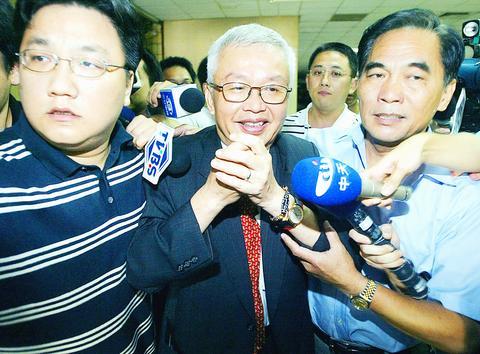Taipei Chief Prosecutor Hsueh Wei-ping (薛維平) yesterday wanted to detain former China Development Holding Corp chairman Liu Tai-ying (劉泰英) on charges of embezzlement and money laundering, but the Taipei District Court decided to let Liu go because of a lack of evidence.
Liu, who is president of the Taiwan Research Institute, was first interrogated by special agents from the Ministry of Justice's Bureau of Investigation at around 9:30am on Friday. At about 4pm, special agents transferred him to the Taipei District Prosecutors' Office for another interrogation by Hsueh.

PHOTO: LUO PEI-DE, LIBERTY TIMES
By about midnight, Hsueh believed that there was a good chance that Liu would destroy pieces of evidence or exchange information with crucial witnesses and filed a detention request.
The Taipei District Court began to review Hsueh's detention request at around 4am yesterday but finally decided to release Liu without bail at 8:20am.
As he was walking out of the court building, Liu said that he had an agreement with the judges that he would not comment on the case in public.
"I am quite tired now. Please understand that I am not supposed to comment on the case outside the courtroom. I gave the judges my word," Liu said.
Hsueh is currently investigating the disappearance in 1994 of US$4.5 million from a secret fund of US$10.58 million to secure Taiwan's diplomatic relationship with South Africa.
According to his investigation, the National Security Bureau paid the amount to South Africa to secure the diplomatic relationship between two countries on behalf of the Ministry of Foreign Affairs in May 1994.
On April 4, 1999, the ministry returned a total of US$10.7 million, including interest, to the bureau. The bureau's former chief accountant, Hsu Ping-chiang (
Liu Kuan-chun is wanted for allegedly embezzling more than NT$192 million from the total amount. According to the Bureau of Investigation, Liu left Taiwan on Sept. 3, 2000 and went to Shanghai. He surfaced in Bangkok in January last year and from there went to North America. Sources say that he is now in Canada.
Liu Tai-ying allegedly wired the money to Ruentex Corp Chairman Yin Yen-liang's (尹衍樑) bank accounts in the US and Singapore. Upon receiving the money, Yin allegedly wired it to one of the Ruentex Corp's bank accounts in Taiwan. Then, he "donated" US$3 million of it to the Taiwan Research Institute. However, prosecutors have not yet discovered the whereabouts of the missing US$4.5 million.
Hsu has been detained since July 18. In addition, prosecutors have also interrogated Yin, then-minister of foreign affairs Jason Hu (胡志強) and many other witnesses. According to Hsu's statement, he insisted that he acted on direct orders from former National Security Bureau secretary-general Yin Tsung-wen (殷宗文). The initial order allegedly came directly from former president Lee Teng-hui (李登輝).
Yin Tsung-wen died of adenocarcinoma, a kind of lung cancer, on March 28 this year.
As a result, whether Lee was involved in or knew of the crime is another mystery which prosecutors are trying to figure out.
Hsueh said that prosecutors may summon Lee if necessary.

The manufacture of the remaining 28 M1A2T Abrams tanks Taiwan purchased from the US has recently been completed, and they are expected to be delivered within the next one to two months, a source said yesterday. The Ministry of National Defense is arranging cargo ships to transport the tanks to Taiwan as soon as possible, said the source, who is familiar with the matter. The estimated arrival time ranges from late this month to early next month, the source said. The 28 Abrams tanks make up the third and final batch of a total of 108 tanks, valued at about NT$40.5 billion

Two Taiwanese prosecutors were questioned by Chinese security personnel at their hotel during a trip to China’s Henan Province this month, the Mainland Affairs Council (MAC) said yesterday. The officers had personal information on the prosecutors, including “when they were assigned to their posts, their work locations and job titles,” MAC Deputy Minister and spokesman Liang Wen-chieh (梁文傑) said. On top of asking about their agencies and positions, the officers also questioned the prosecutors about the Cross-Strait Joint Crime-Fighting and Judicial Mutual Assistance Agreement, a pact that serves as the framework for Taiwan-China cooperation on combating crime and providing judicial assistance, Liang

A group from the Taiwanese Designers in Australia association yesterday represented Taiwan at the Midsumma Pride March in Melbourne. The march, held in the St. Kilda suburb, is the city’s largest LGBTQIA+ parade and the flagship event of the annual Midsumma Festival. It attracted more than 45,000 spectators who supported the 400 groups and 10,000 marchers that participated this year, the association said. Taiwanese Designers said they organized a team to march for Taiwan this year, joining politicians, government agencies, professionals and community organizations in showing support for LGBTQIA+ people and diverse communities. As the first country in Asia to legalize same-sex

MOTIVES QUESTIONED The PLA considers Xi’s policies toward Taiwan to be driven by personal considerations rather than military assessment, the Epoch Times reports Chinese President Xi Jinping’s (習近平) latest purge of the Chinese People’s Liberation Army (PLA) leadership might have been prompted by the military’s opposition to plans of invading Taiwan, the Epoch Times said. The Chinese military opposes waging war against Taiwan by a large consensus, putting it at odds with Xi’s vision, the Falun Gong-affiliated daily said in a report on Thursday, citing anonymous sources with insight into the PLA’s inner workings. The opposition is not the opinion of a few generals, but a widely shared view among the PLA cadre, the Epoch Times cited them as saying. “Chinese forces know full well that